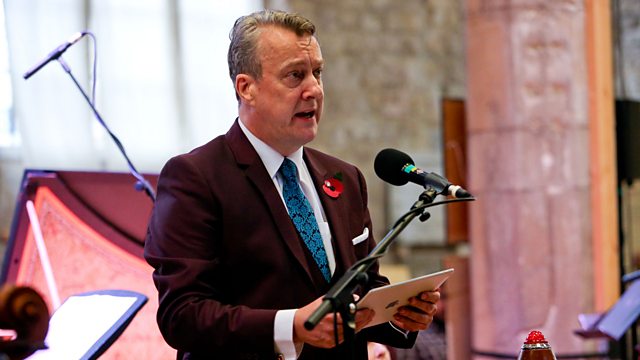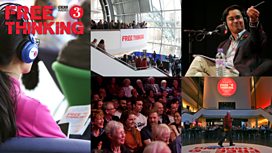
Rules and How to Break Them
Live from St Mary's Church in Gateshead for Free Thinking 2015, texts and music on the theme of 'tearing up the rulebook', with readers Patricia Hodge and Stephen Tompkinson.
From St Mary's Church in Gateshead, a special live edition of Words and Music as part of this year's Free Thinking Festival on the theme 'Tearing Up The Rule Book'. Patricia Hodge and Stephen Tompkinson read texts and poetry about Rules and How to Break Them, accompanied by live music from members of the Royal Northern Sinfonia, choir Voices of Hope, and pianist John Reid.
There are literary characters who railed against the rules, such as Winston in Orwell's 1984, and the unfortunate boys in Golding's Lord of the Flies, real life people like Charles Darwin and Emmeline Pankhurst who dared to challenge the status quo, and writers who broke the rules with their writing style or content. Musically there has been a long tradition of rule-breakers, from Byrd and Shostakovich using their music to subvert religious or political laws, to innovators such as Beethoven, Schoenberg and John Cage who changed the musical direction for all who followed them.
Last on
![]()
Provocative debate, new ideas, music and performance
Music Played
Timings (where shown) are from the start of the programme in hours and minutes
-
The Bible (KJV)
The Ten Commandments, read by Patricia Hodge
![]()
Carlo Gesualdo
Belta poi che tassenti (Book 6 of madrigals 5vv)
Performer: Voices of Hope, Simon Fidler (conductor).Douglas Adams
So long, and thanks for all the fish, read by Stephen Tompkinson
![]()
Anton Webern
3 Kleine Stücke, Op. 11
Performer: Daniel Hammersley (cello), John Reid (piano).Robert Graves
To an Ungentle Critic, read by Patricia Hodge
![]()
Carl Philipp Emanuel Bach
Fantasia in F sharp minor (excerpt)
Performer: John Reid (piano).William Golding
Lord of the Flies, read by Stephen Tompkinson
![]()
Hildegard von Bingen
Praise to the Trinity (Laus Trinitati)
Performer: Voices of Hope, Simon Fidler (conductor).Robert Herrick
Delight in Disorder, read by Patricia Hodge
![]()
Charles Ives
Study no.23
Performer: John Reid (piano).Charles Darwin
On the Origin of Species, read by Stephen Tompkinson
![]()
Ludwig van Beethoven
Grosse Fuge (excerpt)
Performer: Members of the Royal Northern Sinfonia.Emmeline Pankhurst
My Own Story, read by Patricia Hodge
![]()
François Couperin
Les Barricades Mysterieuses
Performer: John Reid (piano).Oscar Wilde
Libertatis Sacra Fames, read by Stephen Tompkinson
![]()
William Byrd
Mass for 4 voices - Agnus Dei
Performer: Voices of Hope, Simon Fidler (conductor).Lewis Carroll
Through the Looking Glass, read by Patricia Hodge
![]()
John Cage
The Wonderful Widow of Eighteen Springs
Performer: Hannah Reynolds (soprano), Mark Edwards (piano percussion).Hilaire Belloc
More Beasts (For Worse Children): The Python, read by Stephen Tompkinson
![]()
Heinrich Ignaz Franz von Biber
Sonata Representativa: Frog + Cock and Hen
Performer: Tristan Gurney (violin), John Reid (harpsichord).George Orwell
1984, read by Patricia Hodge
![]()
Arnold Schoenberg
Little Pieces Op.19
Performer: John Reid (piano).Opening Address for the Prosecution
Lady Chatterley trial, read by Stephen Tompkinson
![]()
Dmitry Shostakovich
String Quartet no. 8: 3rd movement
Performer: Members of Royal Northern Sinfonia.Siegfried Sassoon
Concert Interpretation (Le Sacre de Printemps), read by Patricia Hodge
![]()
Igor Stravinsky
Ave Maria
Performer: Voices of Hope, Simon Fidler (conductor).Lewis Carroll
Rules and Regulations, read by Stephen Tompkinson
![]()
Erik Satie
Vexations
Performer: John Reid (piano).Producer's Note - Rules and How to Break Them
We need rules. Sometime we also need to break them. This programme covers rules in their many forms: moral codes, rules enshrined in law, social norms and artistic conventions. There are artists who have produced great art despite an inability to stay within the law, those who have used their art to subvert religious or political dicta and those who have advanced their field by deliberately defying its conventions. There are also examples of literary characters who railed against the rules, and real people who, by daring to challenge the status quo - whether political, religious, intellectual or social - have changed it for ever.
The programme begins with one well-known set of rules: The Ten Commandments, followed by a madrigal by Gesualdo, who by murdering his wife and her lover broke at least one of them. Then to a concise set of rules from The Hitch Hiker’s Guide to the Galaxy, which I’ve coupled with a composer who stripped music back to its bare bones: Anton Webern. Robert Graves’ poem To an Ungentle Critic suggests that old-fashioned art has as much worth as innovative new art. CPE Bach’s Fantasia which follows shows a composer keen to create his own voice, rather than emulate his “old-fashioned” father, JS Bach. The choirboys stranded on an island without adults in Golding’s Lord of the Flies, are desperately trying to create rules to stop their little society from breaking down. This I felt should be accompanied with choral music – Hildegard of Bingen who was something of an innovator simply by being a female composer in the 12th century (along with being an abbess, writer, philosopher, visionary, etc..) Robert Herrick’s poem extols the virtues of disorder, which I think would have appealed to Charles Ives who could be notoriously unruly in his music.
Then to some real life rule-breakers: Charles Darwin, who realised that his Theory of Evolution wasn’t compatible with the accepted view of how God created the World. Beethoven’s Grosse Fuge which follows was condemned when it was written some thirty years earlier in 1825 for being completely incomprehensible, and to my ears still sounds startlingly modern. Next is Emmeline Pankhurst who, with her fellow WSPU members resorted to militant tactics to persuade the Government of the day to take women’s suffrage seriously. Pankhurst felt a strong connection to the female revolutionaries who stormed the Bastille, so Couperin’s Les Barricades Mysterieuses seemed fitting. In society’s eyes, Oscar Wilde broke the law by being actively homosexual. Here I have chosen his poem Libertatis Sacra Fames (Sacred Hunger for Liberty) in which he muses about socialism. William Byrd was a rule-breaker too, setting Catholic texts: a life-threatening endeavour in post-Reformation England.
Lewis Carroll delights us with his wit in the passage from Through the Looking Glass, where the Red and White Queens exasperate Alice with their arbitrary rules. This is followed with music by John Cage, who famously shook up the musical establishment by writing 4’33 of silence. Four minutes 33 seconds of silence on Radio 3 at this point would in itself subvert the rules of broadcasting mechanics, so I’ve included instead The Wonderful Widow of Eighteen Springs for voice and the wood of the piano, which sets words by another stylistic rule-breaker, James Joyce. A comic poem by Hilaire Belloc about a python is paired with Ignaz von Biber, a composer who broke the rules of string writing by including techniques such as scordatura (mistuning). We’ll hear him in animal mode with part of his Sonata Representativa – Frog, and Cock &Hen.
In George Orwell’s dystopian novel 1984, Julia believes that if you keep the small rules, you can break the big ones without anyone noticing. When Schoenberg broke the big rules by completely reinventing the harmonic system, everyone noticed! We’ll hear his Little Pieces for Piano, in which you can hear him experimenting with tonality before he went on to create his 12 tone method. Next to works of art which the authorities attempted to ban. Penguin Books was taken to court when it tried to publish D.H. Lawrence’s ‘obscene’ novel, Lady Chatterley’s Lover in this country, while Shostakovich’s music fell foul of Stalin’s diktat that composers should only write ‘proletarian’ music. A fellow Russian musical rule-breaker was Stravinsky, whose Rite of Spring was so shocking with Nijinsky’s choreography that it cause a riot. Siegfried Sassoon’s poem Concert Interpretation explores how our attitude as an audience to such shocking sounds changes over time. The final poem is a set of rules again by Lewis Carroll, which signs off with the moral to rule-breakers - ‘behave’. The final composer, Satie, did anything but behave in his music-writing. His Vexations were interpreted by John Cage to be performed 840 times. We might not manage that but we’ll fit in as many as we can before the end of the programme!
Ellie Mant - Producer
Broadcast
- Sun 8 Nov 2015 17:30����ý Radio 3
Featured in...
![]()
Tearing Up The Rulebook—Free Thinking
Programmes and clips from the Radio 3 Free Thinking Festival of ideas, 6-8 November, 2015
The hidden history of plant-based diets
Books website
Get closer to books with in-depth articles, quizzes and our picks from radio & TV.





